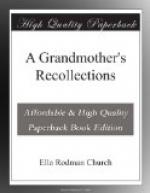The presiding goddess in our region of the house was a faithful and attached old nurse, whom we all called ‘Mammy.’ Although sometimes a little sharp, as was necessary to keep such wild spirits in order, the old nurse was invariably kind, and even indulgent. It was well indeed for us that she was so, for we were left almost entirely to her direction, and saw very little of any one else. Mammy’s everyday attire consisted of a calico short-gown, with large figures, and a stuff petticoat, with a cap whose huge ruffles stood up in all directions; made after a pattern which I have never since beheld, and in which the crown formed the principal feature. But this economical dress was not for want of means; for Mammy’s wardrobe boasted several silk gowns, and visitors seldom stayed at the house without making her a present. On great occasions, she approached our beau-ideal of an empress, by appearing in a black silk dress lace collar, and gold repeater at her side. This particular dress Mammy valued more highly than any of the others, for my father had brought it to her, as a present, from Italy, and the pleasant consciousness of being recollected in this manner by her master was highly gratifying to the old nurse.
I was an only daughter, with several wild brothers, and I often thought that Mammy displayed most unjust partiality. For instance, there was Fred who never did anything right—upset his breakfast, dinner, and tea—several times set the clothes-horse, containing the nursery wardrobe, in a blaze—was forever getting lost, and, when sought for, often found dangling from a three-story window, hanging on by two fingers, and even one—who would scarcely have weighed a person’s life in the scale with a successful joke—and always had a finger, foot, or eye bound up as the result of his hair-brained adventures. I really believe that Mammy bestowed all a mother’s affection on this wild, reckless boy; he seldom missed an opportunity of being impertinent, and yet Mammy invariably said that ’Fred had a saucy tongue, but a good heart.’ This good-heartedness probably consisted in drowning kittens, worrying dogs, and throwing stones at every bird he saw. Fred always had the warmest seat, the most thickly-buttered bread and the largest piece of pie. I remember one day on watching Mammy cut the pie, I observed, as usual, that she reserved the largest piece.
“Who is that for?” I enquired, although perfectly aware of its intended destination.
“O, no one in particular,” replied Mammy.




